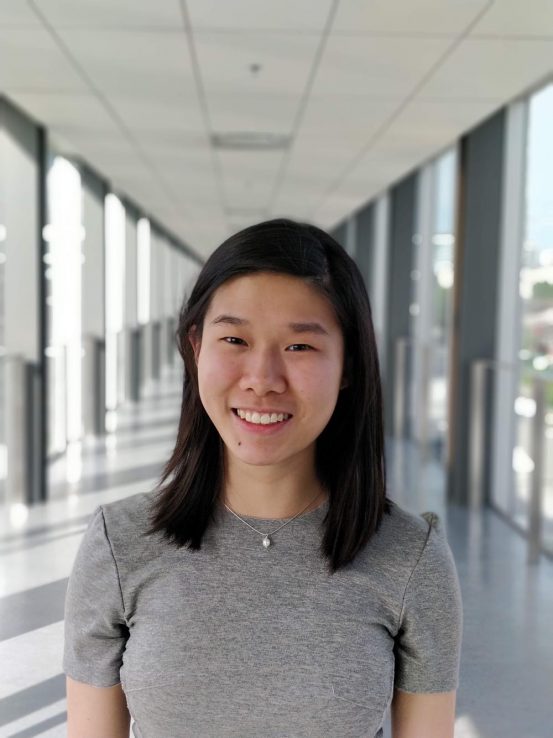What does health system innovation really look like?

This summer, students of the Master’s in System Leadership and Innovation (SLI) shared their pursuit of solutions to health system challenges at a special Research Day, illustrating the many steps involved in making an impact at the health system level.
Hilary Pang and Grace Zhao sought to address the issue of falls among Canada’s older adult population through digital health technology. As medical students, they are no strangers to using advocacy in health care to make a difference. Both have worked with Toronto’s City Council to address the health of the homeless population. Pang, having worked with the Heart and Stroke Foundation and MPPs to enforce caloric labelling on menus in Ontario, and Zhao, having worked with marginalized populations in Vancouver’s downtown east side to address systemic barriers to access of primary care.
“We wanted to focus on project that would have a significant impact,” said Zhao. “Looking at improving care for the older population in Canada, and narrowing the digital divide for older adults and more frequent users of the health system seemed to us to be a space for innovation,” said Zhao.

Statistically, twenty-five percent of Canada’s population aged 55 and over will experience falls. Hospital admission, treatment for broken joints, and residual chronic conditions related to the initial fall can cost the health system billions of dollars, yet Pang and Zhao found this understudied area lacking in solutions for fall prevention.
Working with the Women’s College Hospital Institute for Health System Solutions and Virtual Care (WIHV), the pair designed a qualitative and user-centered approach to an e-health tool that could be used as an intervention method to assist older adults in preventing falls. This survey-based algorithm helps determine whether an individual is at a low, medium or high risk for a fall. Once a patient has filled out this questionnaire, a notification on their scoring is sent to their family care provider.
“We used a current tool created by the Centre for Disease Control (CDC) and adapted it to risk stratify older adults into these categories,” explains Zhao. “The screening tool can be done online or through email, or in person at a clinic.”
Depending on the patient’s risk level, a resource toolkit designed by Pang, Zhao, and collaborators is then sent to the provider and the patient with the goal of helping them understand how they might manage the risk of a fall. Management options like medication or physiotherapy are offered, as well as access to information and community resources in a centralized hub format.

“There currently isn’t a standardized process to screen patients for fall risks,” adds Pang, “and we wanted to create a tool that would aid time-constrained family physicians who may not be able to otherwise address this risk in their patients.”
Emmanuel Igbokwe also explored how to curb risks to patients by focusing on the orthopedic units of Mount Sinai hospital with a goal of optimizing the appropriate use of antibiotic treatments. A medical student with a background in biochemistry, Igbokwe has always been interested in how the health care system works behind the scenes.
“This project has given me the perfect opportunity to explore these interests and the intersection of both health system change and orthopedic surgery,” said Igbokwe.
Evidence suggests that patients who receive an inappropriate type or dose of preoperative antibiotics often do worse post-operatively and are faced with increased rates of morbidity, higher risk of joint infections and may subsequently need further surgical procedures.
“My supervisor, Dr. Jesse Wolfstadt and I wanted to ensure that patients admitted to hospital for joint replacement surgery were getting the right antibiotics, at the right dose and at the right time,” explained Igbokwe.

To do this, Igbokwe and a quality improvement physician committee implemented some strategies aimed at educating hospital staff including the use of antibiotic dosing cards placed in high leverage areas, and monthly check-ins at staff meetings to convey why there was a need to emphasize correct antibiotic use.
“The dosing cards have proven effective in that that are available as a quick reference to best practice guidelines on site in OR’s and on the preadmission care units,” said Igbokwe. “To keep our initiative moving forward, we are now looking at potential strategies to remove antibiotic administration from orthopedic surgeons and automate the process.”
Like Igbokwe, Pang and Zhao also continue to explore next steps in their own work. They want to fine tune their e-health tool by conducting interviews and focus groups with older adults to understand barriers that may be in place for them as an end user.
“This was not just a research project for us, it took initiative and time to focus on the advocacy aspects and learn about inefficiencies in moving products and solutions forward,” said Zhao.
“Addressing systemic innovation is collective and collaborative,” added Pang, “it’s quite important as future physicians to break down silos and become future advocates for change.”
Related News

Sign up for IHPME Connect.
Keep up to date with IHPME’s News & Research, Events & Program, Recognition, e-newsletter.
Subscribe to Connect Newsletter
Get in Contact
Communications
Marielle Boutin
Email Address: ihpme.communications@utoronto.ca





